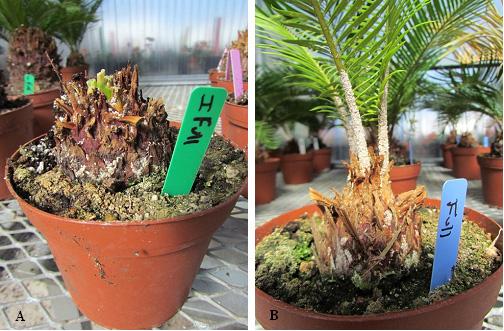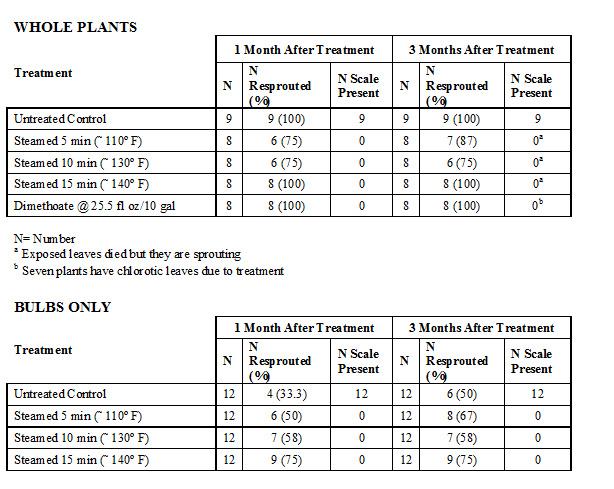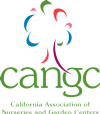Spring 2014: Steam treatment of sago palms infested with scale
Regional Report for San Diego/Riverside Counties by James A. Bethke
Due to the cryptic nature of many invasive species, the ornamental plant trade represents a weak link for the movement of invasive exotic arthropods, and the movement and dispersal across regions and between countries is increasing. For example, some of the Hemiptera (formerly the Homoptera), including scale insects, whiteflies, mealybugs, aphids, adelgids and psyllids, can be shipped unknowingly as eggs or immature stages on plant shoots and other plant parts, or in pots or potting media.
A good example of a pest consistently moved from off shore or interstate to local California growers is the cycad scale, Furchadaspis zamiae (Morgan). They can be exceptionally well hidden in plant tissues (fig.1A), later to emerge and infest new foliage growth (fig.1B). It is very difficult to clean up infested plants for a couple of reasons. First, the cycad scale is an armored scale, which means they are difficult to kill with pesticides. The cover on the armored scale is not a part of the body of the insect, so it acts like a protective umbrella over the insect. Therefore, typical control strategies include applying control measures when eggs hatch and crawlers are present. The crawler stage is the most susceptible to pesticides. Secondly, once the scale insects are present in large enough numbers to make them visible, the plant becomes unattractive and unsalable. Growers typically throw the plants away rather than spend the extra mechanical effort to remove the scale. The leaves can be removed and the plant can re-flush in time, but it is likely that the scale will return and the resource investment is not worth it.
A trial is in progress at the Center for Applied Horticultural Research in Vista, California that investigates steam sterilization for eradication of cycad scale from sagos, Cycas revoluta. Dimethoate is a highly effective systemic insecticide against scale insects, but it is not registered for use on sagos in California. It was included as a positive control to demonstrate efficacy. We treated whole, potted infested plants, and we treated unrooted leafless bulbs. Plants or bulbs were steamed for 5, 10, or 15 minutes, and the highest temperature attained around the bulbs at the end of the cycle was recorded. Following treatment, bulbs were potted into Sunshine mix potting media in a 6-inch pot, and all treated plants were placed on raised greenhouse benches. The plants were observed for several months and observations were made for plant recovery and reinfestation (Table 1).
Table 1. Sago palms, Cycas revoluta, treated with steam for 5, 10, and 15 minutes and with Dimethoate (positive control standard, not registered for this use on sagos) for eradication of the cycad scale, Furchadaspis zamiae. Applications occurred on Oct 15, 2013 and the trial is still in progress.
Preliminary results suggest that all treatment regimens appear to be successful in eliminating the scale from the plants. No reinfestation has been observed for the length of the trial so far (approximately 3 months).
James A. Bethke
Farm Advisor, Nurseries and Floriculture
UC Cooperative Extension San Diego, North County Office
151 E. Carmel St., San Marcos, CA 92078
(760) 752-4715 phone; (760) 752-4725 fax
jabethke@ucdavis.edu












